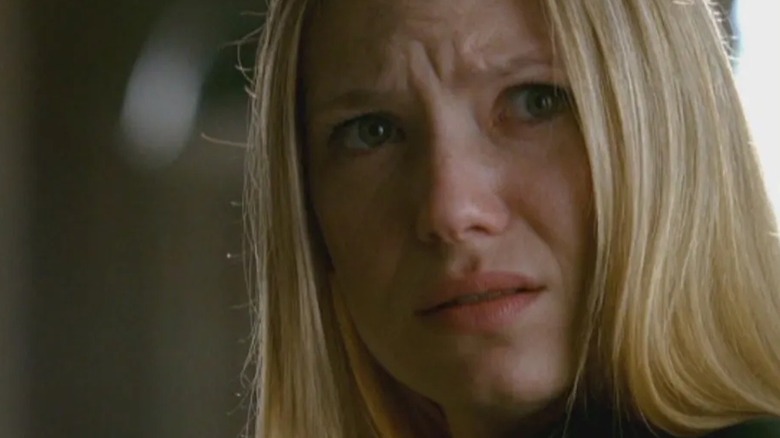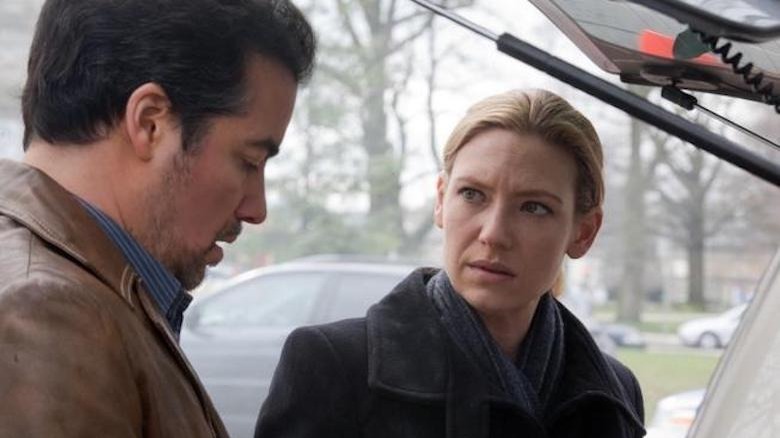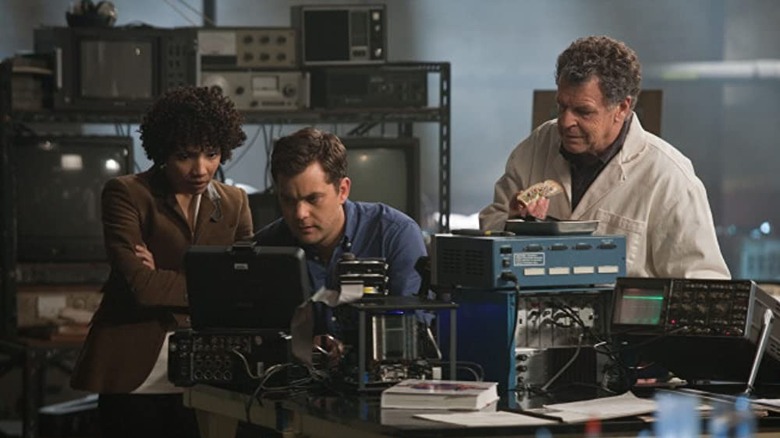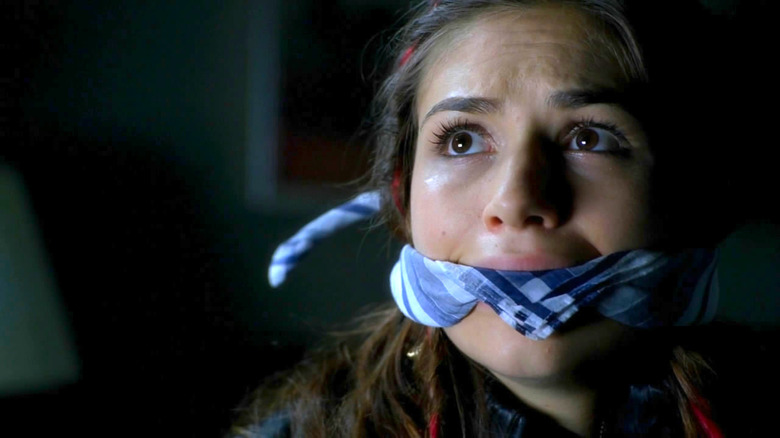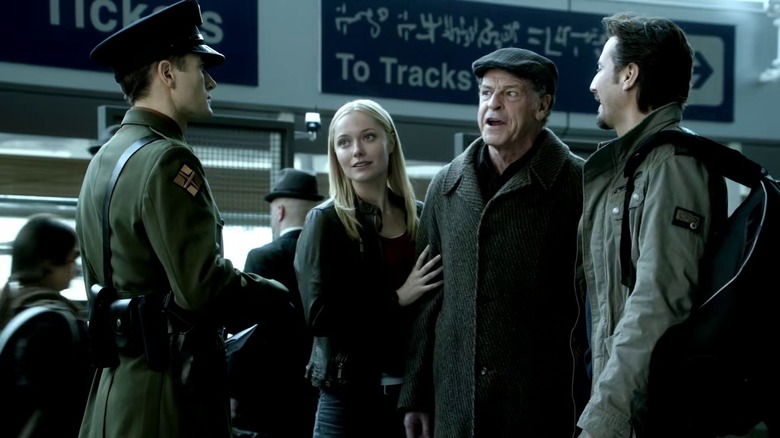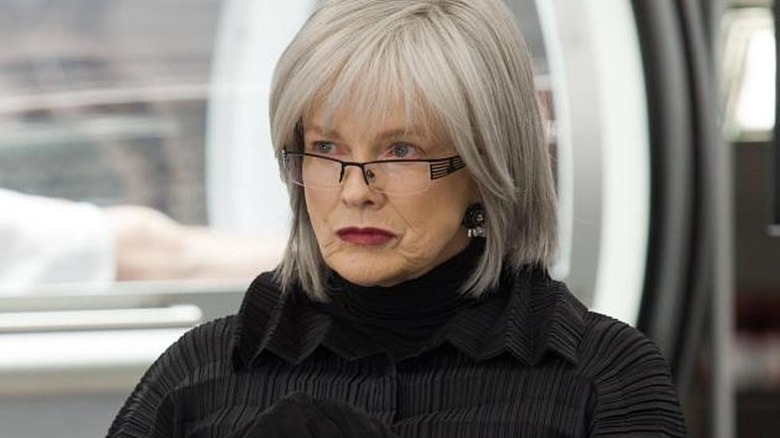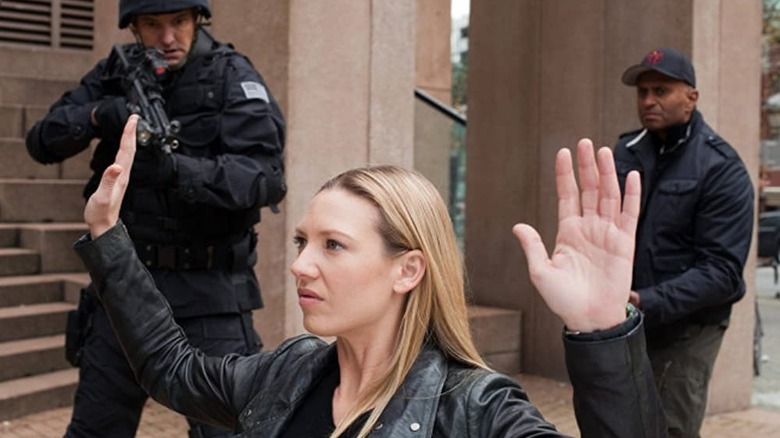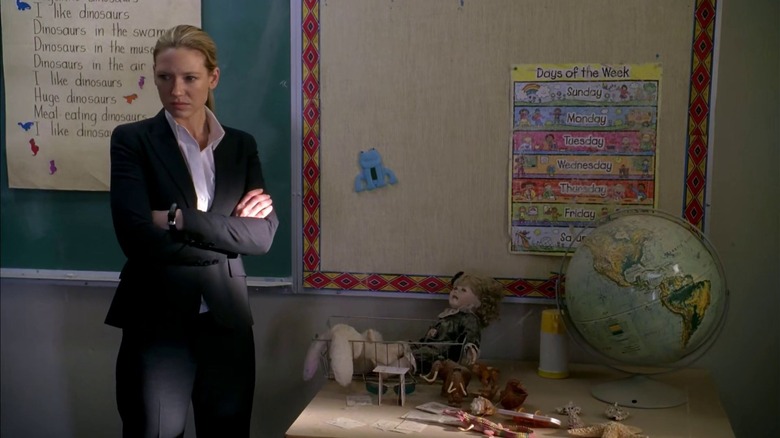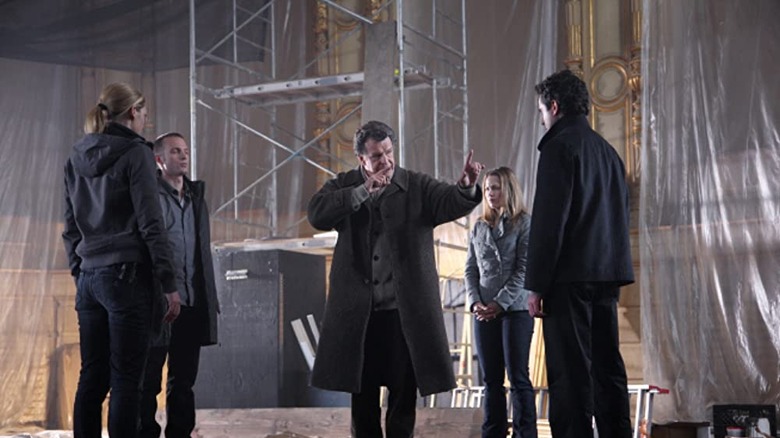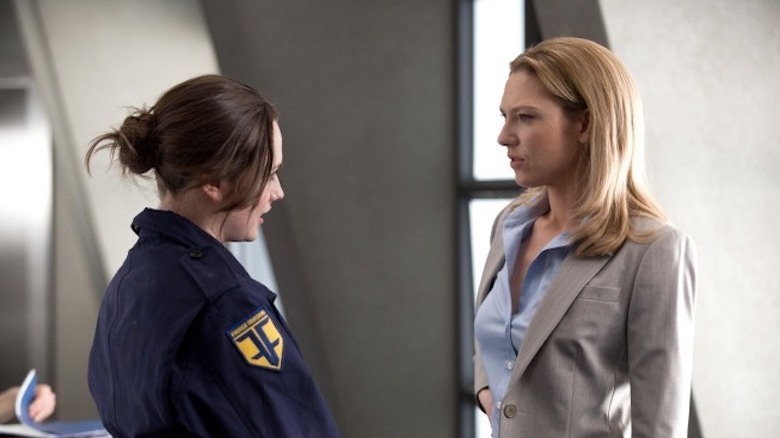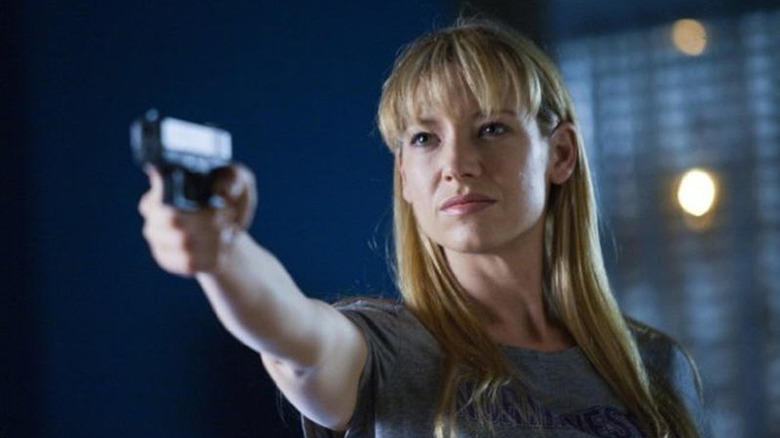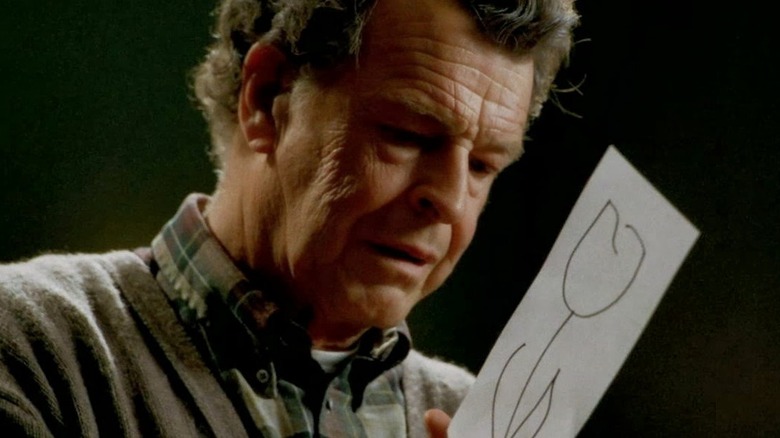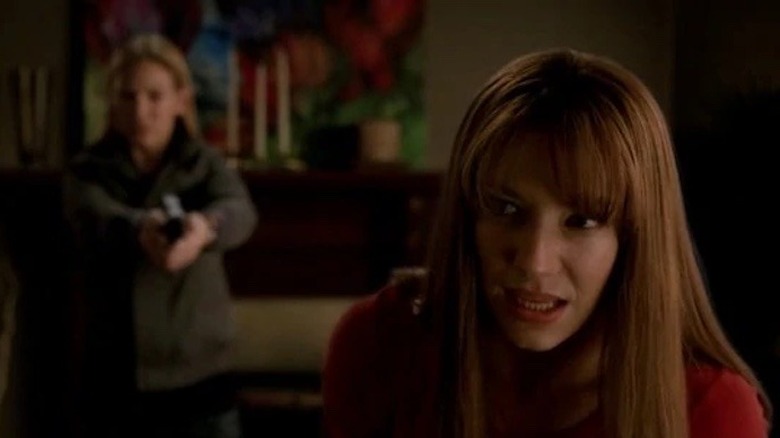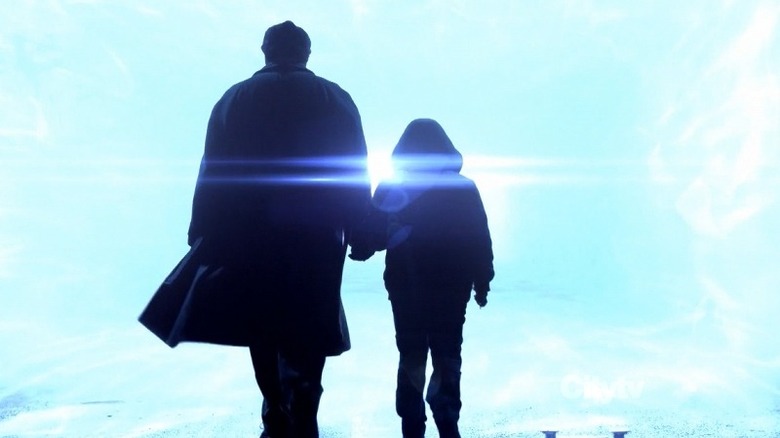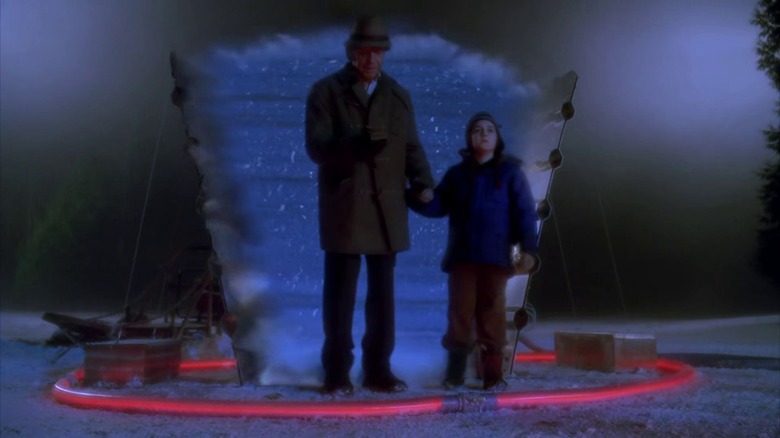15 Best Episodes Of Fringe, Ranked
When you first start watching the Fox series "Fringe," the general contours of the show might feel familiar. A logical FBI agent, Olivia Dunham (Anna Torv) teams up with a charming genius, Peter Bishop (Joshua Jackson), and his zany scientist father, Walter (John Noble), in order to solve the FBI's most mysterious cases. Under the moniker of the Fringe Division, Olivia and the team do their best to explain the unexplainable, all while trying to keep the public from finding out what they know.
Season 1 of "Fringe" feels very much like a sci-fi procedural a la "The X-Files" –- Mulder and Scully dynamic and all -– but longtime fans know the show becomes much more than that as the seasons wear on. Alternative universes, time travel, and telekinesis are just a few of the phenomena that crop up over the series' run, changing the very fabric of the world these characters live in.
It's a brilliant show with a talented cast, and, unlike other shows of its kind, it only got more compelling, even as the otherworldly phenomena therein become increasingly complex. At the core of the story is the heartbreaking, awe-inspiring relationship between Peter and Olivia, as well as the complicated relationship Walter has with his son. In celebration of its greatness, we thought we'd take a look at some of the fan-favorite episodes from the series, which span all of its five seasons. Keep reading to discover our ranking of the very best "Fringe" episodes, quantified using the highly scientific calculation of IMDb user ratings.
15. The Last Sam Weiss (Season 3, Episode 21)
According to IMDb users, the 15th best episode of "Fringe" is "The Last Sam Weiss," which is the penultimate episode of Season 3. The episode sees the characters facing an extremely dangerous, life-and-death situation (but when are they not?). The doomsday machine, which was originally designed by Walter Bishop in order to destroy the alternative universe, is creating dangerous storms in the main universe (known as the Prime Universe). Peter has figured out that the machine is only activated by his specific DNA, but his first attempt to engage with it has failed.
Olivia enlists the help of Sam Weiss (Kevin Corrigan), a mysterious man who seems to spend all his time hanging out in a bowling alley. It tuns out that he's from a long line of men named Sam Weiss who have spent their lives studying "The First People," the civilization who originally created the doomsday machine. Olivia learns that there is a metaphorical crowbar that can override the machine, and Walter realizes that Olivia herself is the crowbar.
It's an extremely complicated and far-fetched episode, but like many in the series, it's successful because the questions it poses are more existential than they are scientific. So much of the series hinges on the relationship between Peter and Olivia as well as Peter and Walter, and this episode is no different. If the specific contours of the episode are too convoluted for you to follow, then remember the central premise of the series: love is always the answer.
14. The End Of All Things (Season 4, Episode 14)
The Season 4 episode "The End Of All Things" takes place during one of the most devastating periods of Peter and Olivia's relationship. At the end of Season 3, Peter activated the doomsday machine – also known as "The Vacuum" –- and was wiped from existence. This created an alternate timeline in which Peter was saved in neither universe. Despite this, Peter continued to bleed into this present timeline, eventually reappearing in Olivia and Walter's lives, despite the lack of recognition.
By "The End Of All Things," the Olivia in this episode is still the one who has lived her life without Peter in it. She is beginning to remember things from the Olivia in Peter's timeline. The episode follows Olivia as she is kidnapped and taken to an abandoned medical facility along with parallel universe Nina Sharp (Blair Brown). David Robert Jones (Jared Harris) wants Olivia to use her abilities, torturing Nina (who raised this version of Olivia) to create an emotional trigger. Nina tells Jones that Olivia's abilities can only be activated if she is in the proximity of Peter, so Jones goes to kidnap Peter as well.
The plan works, but Peter begins to fear that he is corrupting this Olivia with his own memories, rather than letting her choose for herself. After communicating with an Observer, whose purpose he has finally discovered, Peter decides it's best to take a step away from this Olivia, with the hopes that his Olivia will return someday. It's a devastating turn of events for the pair, but fans of "Fringe" know there is always hope where true love is concerned.
13. August (Season 2, Episode 8)
"August" follows the activities of a certain Observer, who, if you'd forgotten, are those creepy-looking bald guys in hats who stand around watching people. In actuality, the Observers are a group of evolved humans from the future who have traveled back in time in order to save their world.
This episode follows an Observer named August (Peter Woodward). Olivia and the team learn that August has been observing a young woman named Christine (Jennifer Missoni) since she was a child. August abducts Christine in order to save her life, as she was set to board a plane destined to crash. The Observers are upset that August has upended her fate, and they send an assassin to kill her, only to be intercepted by August along with Olivia and Peter.
August succumbs to his gunshot wounds, comforted by the fact that Christine -– who he loves and cares about -– will now be safe because she's been made "important" by being responsible for the death of an Observer. While The Observers often appear as somewhat villainous figures, we learn from August and September (Michael Cerveris) that they do have the ability to develop feelings, despite the fact that emotions have supposedly been programmed out of them. The episode presents an interesting dilemma about fate versus free will, a question the show grapples with time and time again.
12. Letters of Transit (Season 4, Episode 19)
Though it initially appeared to be another iteration of show's tradition of making Episode 19 especially nutty or strange, the 19th episode of Season 4 would prove itself to be much more influential than any episode in previous seasons. Set in 2036, the episode takes place in a world where all the Observers have traveled back in time in order to take over the present timeline, ruling with an iron fist. We are introduced to Etta (Georgina Haig), Peter and Olivia's adult daughter. Etta and her friend Simon (Henry Ian Cusick) are members of the Resistance, and they have finally succeeded in freeing the Fringe team from the amber in which they have been trapped for many years.
It's an incredibly risky episode, especially since it kind of stands alone as far as Season 4 is concerned. It comes just before the conclusion of the final Season 4 arc, which doesn't really have anything to do with the events of 2036. But, the writers' gutsy move clearly paid off, as the introduction of this future universe is what allowed the show to get a fifth and final season, kicking off one of the more mind-stretching plotlines of the entire series. Season 5 takes place almost entirely in the dystopic future first introduced in this episode, making it an extremely important episode in the series.
11. Anomaly XB-6783746 (Season 5, Episode 10)
"Anomaly XB-6783746" follows the Fringe team as they encounter an Observer child –- the anomaly in question. The child doesn't have the implants the other Observers have, which create advanced intelligence but inhibit emotions. The team believe that the Observer child, who is named Michael, can help them discover the identity of a mysterious man named Donald, for whom they have been searching. The only problem is that Michael is unwilling (or unable) to communicate with them. They enlist the help of Nina Sharp, who now works for the Observer-run Ministry of Science.
Michael finally communicates with Nina, but the Observers discover her deception, leading her to sacrifice herself to prevent them from reading her mind. Michael communicates what he knows with Walter as well, revealing to the team that Donald is actually September, the first Observer they ever encountered more than 20 years ago. It's an important Season 5 episode, as it gives us both a shocking character death and a revelation about one of the season's mysteries. As its high rating on IMDb indicates, many fans agree it's one of the series' best.
10. Liberty (Season 5, Episode 12)
"Liberty" is the penultimate episode of the entire series. The episode follows the team as they attempt to rescue Michael, who had given himself up to the terrifying Captain Windmark (Michael Kopsa) in the previous episode. Windmark discovers that Michael is even more intelligent than the average Observer but has a greater emotional capacity than the average human. He is told by his superior to "disassemble" Michael so that they may study him further.
The team comes up with a zany plan to rescue Michael from Liberty Island, where he is being held. They will dose Olivia with Cortexhiphan, send her to Liberty Island in the parallel universe, have her cross over to the prime universe, rescue Michael, and hop universes all over again. It may be an outlandish plan, but it's a welcome excuse to get to see alternate universe Olivia (aka Fauxlivia) again. We also learn in this episode that Fauxlivia has married Olivia's former partner, Lincoln (Seth Gabel), and that they have a child together.
With the help of Fauxlivia and Lincoln, they somehow manage to complete their madcap plan, rescuing Michael and preparing to use September's device which will alter the timeline of the past, present, and future. It's a thrilling episode in and of itself while also being an excellent setup to the series' near-perfect finale, so it is no surprise that viewers rated the episode so highly.
9. Jacksonville (Season 2, Episode 15)
There are many moments over the five seasons of "Fringe" that prove especially devastating for Peter and Olivia, and Season 2, Episode 15 contains one of them. In "Jacksonville," the team witnesses an earthquake that seems to have been triggered by the parallel universe. A building from the parallel universe then appears in the prime universe, leading Walter to believe that a building in the prime universe must be destroyed in order to restore the balance.
Walter tells Olivia she must regain her ability to see objects from the parallel universe in order to identify the building that will be destroyed. He takes her back to the facility in Jacksonville where she was first experimented on. She is able to communicate with her younger self, but Walter realizes she can no longer access her powers because she's lost her fear. Upon returning to New York, Olivia is devastated that she cannot help identify the building, thus triggering her fear once more and allowing her to see which building is from a parallel universe due to its distinctive shimmer.
All seems well in the world until Olivia arrives at Peter's house that evening for a date. When she opens the door, Peter is shimmering the same way the building was. Walter asks Olivia not to tell Peter his secret -– that he is actually from the parallel universe –- a destructive omission that creates turmoil between the three in future episodes.
8. Over There: Part 1 (Season 2, Episode 22)
The two-part Season 2 finale sees the series set it sights squarely on the parallel universe. The Fringe team learns that Peter has returned to the parallel universe (also known as the Other Side) in order to reunite with his real father, known as Walternate. One of the Observers informs Olivia that Peter is foretold to be responsible for the end of the world, so the team devises a plan to warn Peter of his fate.
They recruit three other Cortexiphan test subjects who have abilities like Olivia in order to cross over to the Other Side. The Fringe Division on the Other Side immediately detects their presence, but they manage to temporarily escape. While Peter reunites with his real mother, Elizabeth (Orla Brady), the rest of the team ventures to meet with William Bell (Leonard Nimoy) but they are intercepted by the alternate Fringe Division. Walter is shot and winds up in the hospital, while Walternate concocts his nefarious plan for the doomsday machine.
Without its counterpart, the episode is not really complete, but it's a suspenseful setup to an even more thrilling finale, and it's exciting to get to spend more time in the Other Side than we ever have before.
7. The Day We Died (Season 3, Episode 22)
"The Day We Died" begins when Peter wakes up in the year 2026. The parallel universe has been destroyed by the doomsday machine, but the prime universe continues to suffer from the same dangerous singularities that plagued the parallel universe. Peter and Olivia are now married and working to stop a terrorist group called the "End of Dayers," who are on a mission to worsen the singularities and hasten the end of the world. Peter learns that his biological father, Walternate, is behind the End of Dayers, and Walternate then shoots and kills Olivia in order to enact his revenge on Peter for activating the doomsday machine and destroying his world.
After grieving the loss of Olivia in the future, Peter returns to 2011 and convinces the two sides to cooperate, merging the universes and creating a bridge between the two worlds. The two Fringe Divisions agree to work together to save both universes, but Peter inexplicably disappears in the interim, seemingly forgotten by the rest of the team. Peter's disappearance has huge ripple effects in the next season, as the characters find themselves navigating a world without Peter, while Peter must reckon with the fact that nobody knows who he is. Though the exact nature of Peter's disappearance may remain puzzling to some fans, it's an audacious season finale that paves the way for the dystopian future to come.
6. Entrada (Season 3, Episode 8)
After the discovery of the parallel universe -– often known as Over There -– in the previous season, Season 3 spent much of its runtime following the interplay between the two worlds. The beginning of Season 3 saw the introduction of Fauxlivia, aka Oliva from Over There, who traveled to Over Here in order to impersonate our Olivia and ingratiate herself into Peter and the team's lives. Fauxlivia's presence in the prime universe had devastating repercussions for Peter and Olivia's relationship, as Olivia remained trapped Over There while Fauxlivia was becoming closer and closer to Peter.
The eighth episode of Season 3 brings this arc to a close, as Olivia struggles to escape from Over There while Peter realizes that the Olivia he has been canoodling with is not the Olivia he knows. Olivia hatches a plan to avoid having her brain operated on, while Fauxlivia escapes the Fringe team's clutches before they can stop her from crossing over.
It's a gripping episode and a great showcase for the "Fringe" writing room. Anna Torv's acting in the episode and the episodes preceding it is especially masterful, as she convincingly portrays both versions of Olivia with a ton of nuance and distinction. It's a shame Torv didn't win an Emmy for her performance this season, as she most certainly deserved it.
5. There's More Than One Of Everything (Season 1, Episode 20)
The finale of Season 1 was the episode that made "Fringe" the critically successful series that it is, introducing one of the most central pieces of mythology in the show. According to Entertainment Weekly, the show's creators had an idea of what they wanted the central conflict of the show to be — a war between the two parallel universes — but they had originally intended to draw out this tension for several seasons. As the story goes, Bryan Burk and Akiva Goldsman changed their minds and decided the central mystery should be revealed at an earlier point in the series.
The result is the shocking season finale, a sharp left turn that gave the show a necessary sense of propulsion and intrigue, and it surely inspired plenty of water cooler talk. "There's More Than One Of Everything" took a big swig, and the gamble paid off. Season 1 antagonist David Robert Jones is killed (or so we think), and we are introduced to the concept of the parallel universe, known as Over There.
We learn that Walter's real son died, and that our Peter is presumably the Peter from Over There. We're also introduced to Walter's former partner, William Bell, played in a brilliant casting choice by Leonard Nimoy. The secret of the parallel universe isn't revealed until the end of the episode, when Olivia finds herself inside one of the Twin Towers — which never fell Over There — with none other than Bell himself. It's a jaw-dropping way to end the season, and, as was certainly by design, left viewers with more questions than answers.
4. White Tulip (Season 2, Episode 18)
"White Tulip" is a truly stunning episode of television. Combining the very best elements of a bottle episode with the show's broader mythology, the writers knocked it out of the park with this one. The episode also beautifully tackles the concepts of faith and the scientific method, allowing viewers to come to their own conclusions about which side prevails in the end.
The central storyline in the episode revolves around a man named Alistair Peck (Peter Weller), an astrophysics professor who has lost his fiancée. Facing debilitating guilt over not being able to save her, Peck constructs a time machine inside of his own body in order to travel back in time and save her life. Unfortunately, his time travel has the potential to lead to the deaths of many others, but he is too determined to stop his plan.
Meanwhile, Walter is wracked with guilt over his choice to take Peter from Over There, and is struggling to tell Peter the truth. We learn that Walter has always wanted a sign of forgiveness from God, and he gets this sign in the form of a white tulip sent by Peck. It's a perfectly executed episode, and it masterfully explores the existential questions that coincide with the quest for scientific discovery and progress. Peter Weller and John Noble give incredibly touching performances, and it's hard not to sympathize with the two men despite the dangerous choices they've made.
3. Over There: Part 2 (Season 2, Episode 23)
The second part of the Season 2 finale takes place right where the first part left off. Fauxlivia and Alt-Charlie (Kirk Acevedo) discover that Walter is at the hospital, but Olivia and Bell rescue him before they can catch him. Walternate manipulates Peter into using the doomsday machine, while Bell attempts to repair his relationship with Walter.
One of the most legendary scenes in the episode is the fight between Olivia and Fauxlivia, which is something of a televisual marvel. Olivia wins the fight by knocking Fauxlivia unconscious, after which she dyes and cuts her hair in order to impersonate Fauxlivia. Olivia successfully finds Peter, revealing to him Walternate's true intentions with the doomsday machine and in turn confessing her feelings for him.
Olivia then convinces Peter to return to their (or her) universe together, but the episode ends with a shocking revelation. With the help of William Bell, Olivia, Walter, and Peter are able to return to their universe, but viewers are shocked to discover it's not Olivia who has traveled back with them, but rather Fauxlivia. Meanwhile, Walternate has trapped Olivia in his facility, holding her captive for as-of-yet unknown reasons. It's a beautiful setup for one of the central conflicts of Season 3, and the cliffhanger ending is enough to leave fans itching for more.
2. An Enemy of Fate (Season 5, Episode 13)
Over the course of the show's five seasons, "Fringe" created a densely tangled web of mythology, each new piece of the puzzle building off the last and creating an incredibly complex world that requires an index to truly understand. For a show as complicated as this one, truly sticking the landing with the finale is extremely hard to do, especially because so many loose ends need to be tied up in order to create a satisfying conclusion. Against all odds, "Fringe" was able to bring it home with "An Enemy of Fate."
Most of the episode revolves around the activation of September's time-traveling device, which will send Michael to the future in order to stop the creation of the Observers. Walter realizes he must sacrifice himself for the plan in order to prevent a paradox in the present, and prepares himself to travel with Michael to the future. Meanwhile, Michael's long-awaited plan is successful, as Olivia draws on her powers to finally defeat Windmark.
It's an expertly executed conclusion to the show that perfectly illustrates the theme the entire series; namely, the indestructible power of love. It seemed impossible to imagine in earlier seasons that Peter and Olivia would ever get their happy ending, or even that domestic bliss would be something we would hope for them. "An Enemy of Fate” is successful as a finale because it earns its touching ending, giving fans something they didn't even know they needed.
1. Peter (Season 2, Episode 16)
"Peter" is arguably the most important episode in all of "Fringe" because it explains the origin of the rift between the two universes and how our Peter came to be Over Here. "Peter" is "Fringe" at its best –- from the exploration of its mythology to its pitch-perfect writing and acting, it's a masterful episode of science fiction television.
While we had been getting bits and pieces of Peter and Walter's story in previous episodes, this episode is the one that really ties everything together, and it's a satisfying yet devastating conclusion. We get a full look at Walter's grief after losing his Peter, and also some interesting insights into what Walter was like before the brain damage and institutionalization. We also finally learn how Nina Sharp lost her arm and what role September played in all this. The 1980s setting of the episode is a treat as well, and the '80s-inspired theme sequence is especially cool.
The episode is a masterclass of television writing, but what really makes it a top-tier episode is John Noble's performance as the grief-stricken Walter. Time and time again we see Walter make terrible decisions that negatively affect the people around him, and this episode is no different. But Noble imbues Walter with so much pathos that it's hard to really condemn him, ill-fated scientific experiments and all. "Peter" perfectly captures what "Fringe" is all about: the push and pull between science and love, and the lengths we go travel to protect the ones we care for most.
